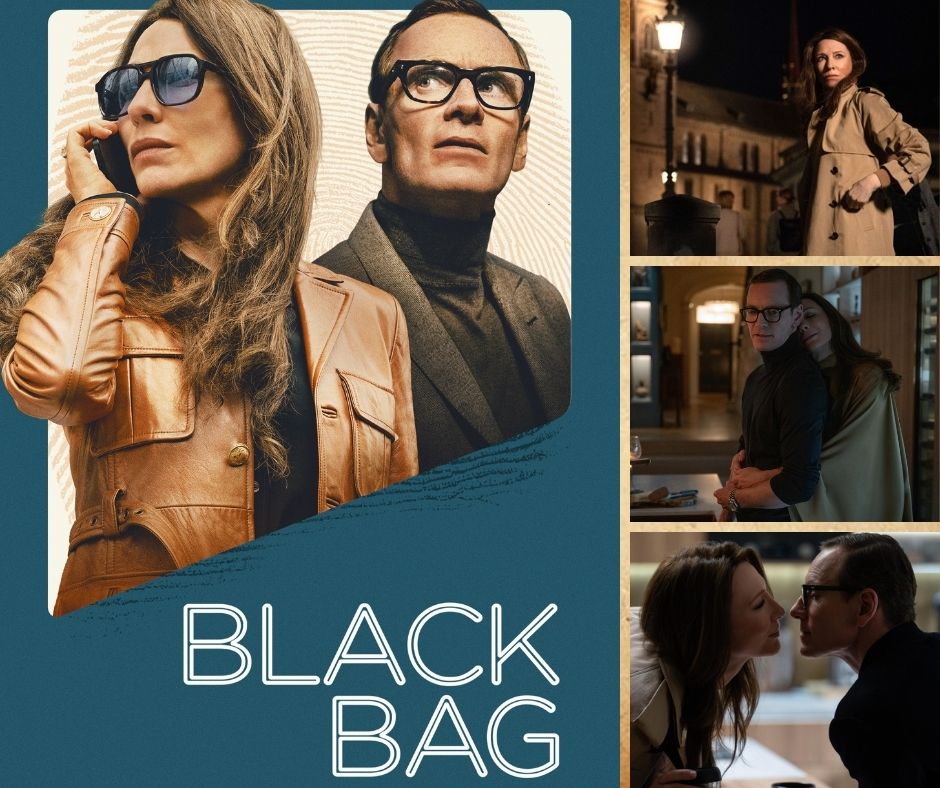Black Bag
Espionage, Secrets, and Marital Deception

In Black Bag (a term used to describe not only secretive operations but also the secrets spies keep from their spouses), George Woodhouse (Michael Fassbender), a seasoned British intelligence agent, receives a list of five suspects in the theft of a classified software called Severus—a national betrayal of the highest order. To uncover the truth, he invites them all to dinner. Among them are two couples, both working in British intelligence… and his own wife. Rather than relying on gadgets and explosions, the film builds its espionage around conversations that dissect the dynamics of these spy couples. Ever wondered if secret agents manage to maintain healthy relationships? This movie might shed some light on that.
Since announcing his retirement—and then casually ignoring it—director Steven Soderbergh has kept up a steady output, always technically precise yet seemingly having fun with the process. Black Bag is no different. He once again shoots and edits the film himself, keeping everything sharp, fast, and effectively suspenseful. The result feels like a film made by someone who deeply understands cinema, knows exactly what he wants, plays around with it a bit, and wraps it up before moving on to his next project.
Despite the fun Soderbergh may be having by returning to the espionage genre (Haywire)—while also sharing a few similarities with his Ocean’s Eleven films—the tone here is more serious. Fassbender plays the kind of cold, calculated character that has defined much of his career. His George is constantly watching, observing every reaction, and part of the film’s appeal lies in catching his micro-expressions during these conversations. The dialogue-heavy scenes are dynamically filmed, and it’s commendable how Soderbergh keeps a movie that’s 85% people talking—mostly in one-on-one exchanges—consistently captivating. The script and performances certainly help, as does the sleek production design. Sometimes, even small details—like a ‘moving’ fish in a restaurant—add unexpected visual interest. Occasionally, Soderbergh takes the action beyond these confined rooms, and a particularly tense satellite espionage sequence stands out as the film’s highlight. More moments like that would have been welcome.
Out of the six characters (all well-acted by a strong ensemble cast), the central couple is the most compelling. Fassbender balances dryness without slipping into detachment, while Cate Blanchett leans into a fun, Mr. & Mrs. Smith-style performance—right down to a similar hairdo. Their scenes together are particularly engaging, conveying their long history as a couple. I only wish the film had given us even more of their dynamic (who knows… sequels?). While always entertaining, none of the relationships go beyond somewhat surface-level interactions, and the film could have dug deeper into the complexities of these partnerships—especially George and Kathryn’s.
Despite a few minor quibbles—like a slightly rushed ending and Pierce Brosnan’s oddly distracting prosthetic nose—Black Bag delivers the expected pleasures of a whodunnit while offering an intriguing look at the complexities of personal relationships in the world of espionage. It may not aim for nail-biting suspense or a deep psychological dissection, but it remains an entertaining and well-crafted thriller that holds your attention through every twist and turn.